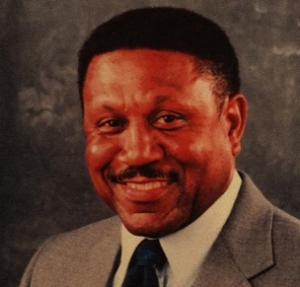PV football great, John Payton passes
Was also first black coach at Beaumont’s Lamar U.
Running back, all-time leading rusher and two-time black college All-American John Payton passed away on Saturday Jan. 27 at age 83. A Livingston, Texas native, Payton was a key component on the Panthers 1953 National Championship team that defeated Florida A&M, 33-27, in the Orange Blossom Classic.
Payton, who played for Billy Nicks, also holds the single game touchdown rushing record (4 /1954) and the single season rushing record (1,546/1954). The Panthers won three SWAC championships during Payton’s time on The Hill.
Payton signed a pro contract with the Chicago Bears, but a knee injury prevented him from pursuing a pro football career. However, Payton – a 1988 inductee to the Prairie View Sports Hall of Fame – would put together a distinguished 57-year coaching career beginning at Scott High School in Woodville. There, he coached football, basketball and track and led the 1957 and 1958 basketball teams to the Prairie View Interscholastic League state 1-A titles that featured another would-be PVAMU great, Zelmo Beaty as Scott won 77 of 84 games in the two-year span. Payton added to that success by leading Charlton-Pollard High School in Beaumont to the 1964 state basketball championship and the 1970 Region III track and field title.
Later in 1970, Payton became the first African-American coach in Lamar University history when athletics director J.B. Higgins hired him to coach offensive backs under then-coach Vernon Glass. Payton remained in that position with the Cardinals until 1982 when he was the assistant to head coach Ken Stephens. Payton was a 2003 inductee into the school’s Hall of Honor.
He retired from Lamar after 43 years and, in 2010, was recognized as one of Lamar’s Legends. In the Cardinals’ Football Athletic Complex, the Academic Success Center is named in his honor.
After coaching, Payton picked up a whistle and became an official for high school football and basketball games. He was presented the Distinguished Service Award for Basketball Officials in 1992.
Among his many other numerous recognitions, Payton was inducted to the Livingston Dunbar Hall of Fame, the Texas High School Basketball HOF, the Texas Black Sports HOF, and was awarded the William “Billy” Nicks Legend Award at PVAMU. (Read Payton’s obituary)
Orangeburg Massacre survivors fight for remembrance of bloodiest civil rights event in S.C. history
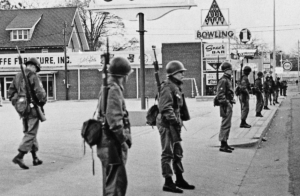
South Carolina National Guard line up near the segregated bowling alley in Orangeburg, S.C. on Feb. 8, 1968. (Associated Press)
ORANGEBURG – Cleveland Sellers can’t say for sure how long the gunfire lasted.
Was it 8 seconds? He wonders. Maybe it was closer to 10.
On the campus of South Carolina State University, he stops at the very spot where he stood when he was shot 50 years ago.
He was 23 on the night of Feb. 8, 1968, and joined the crowd of students who had gathered to vent frustrations over a segregated bowling alley and other concerns. It was the third straight day of unrest, but this one was especially menacing.
“I had a bad feeling that day,” recalled Sellers, now 73.
In a barrage of trooper shotgun fire that lasted about 10 seconds, at least 28 students were injured and three – Samuel Hammond, Jr., Delano Middleton and Henry Smith –
were killed.
It was the bloodiest civil rights event in South Carolina’s history. (more)
Restoration of Tamina’s Sweet Rest Cemetery would provide grave site for children killed in fire

A headstone is seen partially submerged by water in Sweetrest Cemetery, Saturday, Jan. 13, 2018, in the historic Tamina community. The 12-acre cemetery is the resting place for approximately 261 members of the founding Montgomery County community founded by freed slaves near The Woodlands. (Jason Fochtman, Houston Chronicle)
Pastor Bobby Johnson Sr. still is healing from the house fire that claimed the lives of three of his grandchildren in Tamina less than a year ago. But on Friday night, the 60-year-old came out to a town hall meeting in support of an effort inspired by the tragedy.
The new nonprofit Tamina Cemetery and Community Development Corporation hosted the meeting Friday night to discuss restoring the submerged Sweet Rest Cemetery, water drainage issues and fire hydrants. The corporation is spearheading the projects with a hope the collaborative effort will become a healing point for the grieving community.
If restored, Johnson confirmed that the family hopes to move his late grandchildren to be buried at Sweet Rest Cemetery where relatives, former slaves, Native Americans and original Tamina settlers rest.
“That’s home to us, that’s family to us,” Johnson said. “My grandfather and my grandmother, I have aunties down there. “We have family in that cemetery.” (more)
TIPHC Bookshelf
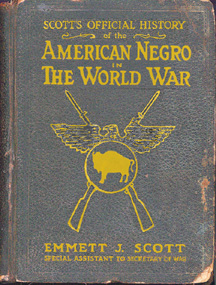 Published scholarship on black history in Texas is growing and we’d like to share with you some suggested readings, both current and past, from some of the preeminent history scholars in Texas and beyond. We invite you to take a look at our bookshelf page – including a featured selection – and check back as the list grows. A different selection will be featured each week. We welcome suggestions and reviews. This week, we offer, “Scott’s Official History of the American Negro in the World War,” by Emmett J. Scott.
Published scholarship on black history in Texas is growing and we’d like to share with you some suggested readings, both current and past, from some of the preeminent history scholars in Texas and beyond. We invite you to take a look at our bookshelf page – including a featured selection – and check back as the list grows. A different selection will be featured each week. We welcome suggestions and reviews. This week, we offer, “Scott’s Official History of the American Negro in the World War,” by Emmett J. Scott.
The Negro, in the great World War for Freedom and Democracy, has proved to be a notable and inspiring figure. The record and achievements of this racial group, as brave soldiers and loyal citizens, furnish one of the brightest chapters in American history. The ready response of Negro draftees to the Selective Service calls together with the numerous patriotic activities of Negroes generally, gave ample evidence of their whole-souled support and their 100 per cent Americanism. It is difficult to indicate which rendered the greater service to their Country – the 400,000 or more of them who entered active military service (many of whom fearlessly and victoriously fought upon the battlefields of France) or the millions of other loyal members of this race whose useful industry in fields, factories, forests, mines, together with many other indispensable civilian activities, so vitally helped the Federal authorities in carrying the war to a successful conclusion. (1919)
This Week in Texas Black History
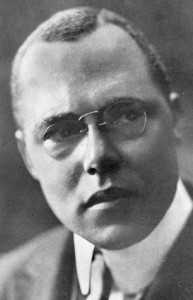
Emmett Scott
Feb13
On this day in 1873, Emmett J. Scott was born in Houston. Scott was a journalist and administrator who worked for the Houston Post, but in 1894 he founded Houston’s first black newspaper, the Houston Freeman, a weekly newspaper. For many years, Scott was the personal secretary for Booker T. Washington, and during World War I was in charge of Negro affairs as a special assistant to the U.S. Secretary of War. That position made Scott the highest ranking black person in President Woodrow Wilson’s administration and led to many changes for black soldiers with many of the issues they faced and the participation of black units in World War I outlined in Scott’s Official History of the American Negro in the World War (1919). Among the changes Scott helped to bring about were:
- The continuance of training camps for black officers and the increase in their number and an enlargement of their scope of training.
- Betterment of the general conditions in the camps where blacks are stationed in large numbers, and positive steps taken to reduce race friction to a minimum wherever soldiers of opposite races are brought into contact.
- An increase from four to 60 in the number of black Army chaplains.
- The opening of every branch of the military service to black men, on equal terms with all others, and the commissioning of many black men as officers in the Medical Corps.
- Large increase in the number of black line officers with the total increasing from less than a dozen at the beginning of the war to more than 1,200.
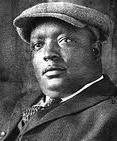
Rube Foster
Feb13
In 1920, on this date, Rube Foster – a native of Calvert, Texas – led the founding of baseball’s first successful all-black league, the Negro National League, headquartered in Kansas City, Mo. Foster was league president, as well as manager and player (pitcher) for the Chicago American Giants. He is known as “the father of black baseball.”
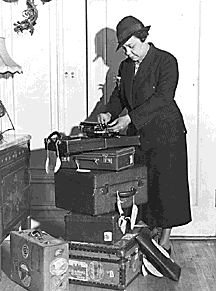
Fay Jackson
Feb15
Dallas journalist and publicist Fay Jackson was born on this day in 1902. Jackson founded Flash in the late 1920s, the first black news magazine on the West Coast and during the 1930s she became the first black Hollywood correspondent with the Associated Negro Press (ANP). Jackson was also the ANP’s first black foreign correspondent.
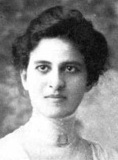
Maud Cuney-Hare
Feb17
On this date, Maud Cuney-Hare, daughter of prominent Texas Republican Norris Wright Cuney, was born on this day in Galveston. Cuney-Hare became a musician, author/folklorist, and music historian after studying piano at the New England Conservatory of Music. She taught music at the Texas Deaf, Dumb, and Blind Institute for Colored Youths in 1897 and 1898; at the settlement program of the Institutional Church of Chicago during 1900 and 1901; and at Prairie View State College (now Prairie View A&M University), in 1903 and 1904. Her best known work is the groundbreaking book Negro Musicians and Their Music.
Blog: Ron Goodwin, Ph.D., author, PVAMU history professor
Ron Goodwin’s bi-weekly blog appears exclusively for TIPHC. Goodwin is a San Antonio native and Air Force veteran. Generally, his column addresses contemporary issues in the black community and how they relate to black history. He and the TIPHC staff welcome your comments.
Latest Entries
A New Hope
Forgive me for borrowing the title of one of the most profitable films in history, “Star Wars: A New Hope.” I’ve always been enamored by space. I’m a child of the 1960s and I remember playing with my Major Matt Mason action figure (not a doll!) as my family [...]
Tell me the truth
Democracy – a) government by the people, b) a government in which the supreme power is vested in the people and exercised by them, directly or indirectly through a system of representation usually involving periodically held free elections. Merriam-Webster Dictionary There were many things I learned from my father. [...]
Submissions Wanted
Historians, scholars, students, lend us your…writings. Help us produce the most comprehensive documentation ever undertaken for the African American experience in Texas. We encourage you to contribute items about people, places, events, issues, politics/legislation, sports, entertainment, religion, etc., as general entries or essays. Our documentation is wide-ranging and diverse, and you may research and write about the subject of your interest or, to start, please consult our list of suggested biographical entries and see submission guidelines. However, all topics must be approved by TIPHC editors before beginning your research/writing.
We welcome your questions or comments. Please contact Mr. Michael Hurd, Director of TIPHC, at mdhurd@pvamu.edu.

